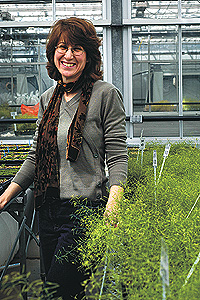Jocelyn Malamy, Associate Professor in Molecular Genetics and Cell Biology
By Theresa CarsonMedical Center Public Affairs
 Jocelyn Malamy | |
How does one begin to solve the problem of world hunger? Jocelyn Malamy gives her students $250 million—theoretically, that is—to look for answers and the opportunity to learn about many sides of the issue.
Malamy, Associate Professor in Molecular Genetics & Cell Biology and a recipient of a 2006 Llewellyn John and Harriet Manchester Quantrell Award for Excellence in Undergraduate Teaching, has developed the course Complex Problem of World Hunger, to look at world hunger from many viewpoints. The course is sponsored by the Big Problems Curriculum and a grant from the National Science Foundation.
The goal is to apply knowledge to actual problems. Grounding the exercise in reality, they focus on Ethiopia. “This course aims to ask why there are food shortages,” explained Malamy, who co-teaches the course with Donald Levine, the Peter B. Ritzma Professor in Sociology and the College.
This year’s class consisted of students concentrating in biology, economics, history, political science, pre-medicine, psychology, philosophy, international studies, chemistry, law letters and Latin American studies.
To engage students from different disciplines, she organized them into task forces, allocated the hypothetical $250 million over a five-year period of funding, gave them access to some of the leading experts on Ethiopian history, culture and politics, agriculture, international development institutions and macroeconomics and challenged the students to work toward alleviating the problematic situation in Ethiopia.
After three weeks of instruction from Malamy and Levine, students had a chance to hear guest speakers and University faculty members from backgrounds as varied as those of the students.
This year, the list of speakers included Berhanu Abegaz, an economist and professor at the College of William and Mary; Daniel Assefa, an Ethiopian economist; Gabisa Ejeta, a professor of plant breeding and genetics at Purdue University; Tom Evans, Lecturer in Economics and the College; Phil Pardey, a professor of science and technology policy at the University of Minnesota; Tracy Poe, a historian and specialist in international migration and critical race theory; and Marvin Zonis, Professor of Business Administration in the Graduate School of Business.
“I tell them to get what they need to know from each speaker” to help them allocate their funds in an informed manner, Malamy elaborated.
Toward the end of the course, each group will present a proposal, meet as a larger group and develop a final proposal as a class.
She encourages students to develop a deeper understanding of the issue’s complexities and to think outside their fields. “This is the next generation of policy-makers. If not them, who [will solve the problem]?” she rhetorically asked.
“This award coming from my students means more than I can say,” she said, speaking of the Quantrell award. “They are wonderful, sophisticated, tight and logical thinkers.”
In addition to teaching, Malamy is working with Doug Bishop, Associate Professor in Radiation & Cellular Oncology, to create a specialization in genetics, which she will oversee.
As part of the specialization,she also arranges for graduate students to meet with groups of undergraduate students and prepare them to attend genetics seminars with the basic knowledge they need to understand the topic at hand. “The best thing we can offer our undergraduate students is to let them participate in our departmental seminar series,” she said.
She embraces the same philosophy in her lab and opens it up to undergraduate students. Funded by the National Science Foundation and the U.S. Department of Agriculture, her current research project studies root systems in plants. In particular, she studies lateral root development in Arabidopsis thaliana. Currently, she and her graduate students are trying to determine the genes that regulate root system architecture, and use this knowledge to develop soybeans and tomatoes with improved root system traits.
The goal is to learn how to provide crops that can better survive in otherwise unsuitable growing conditions. She dreams of growing crops in developing countries that currently are challenged by adverse climates. “My hope is as we learn things through basic science, we can apply the knowledge toward improving agriculture in the developing world.”
![[Chronicle]](/images/sidebar_header_oct06.gif)